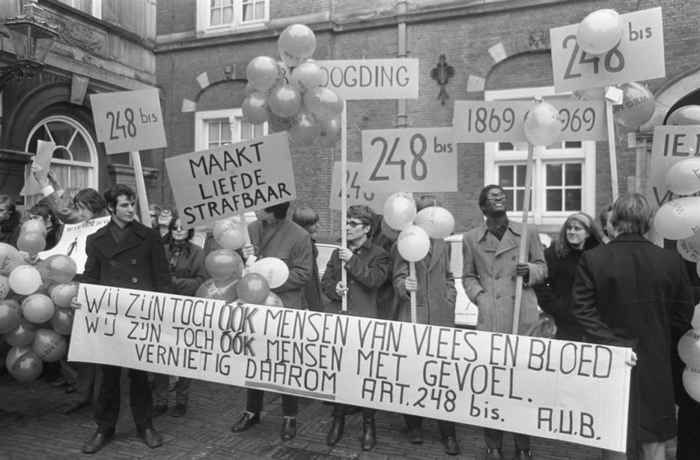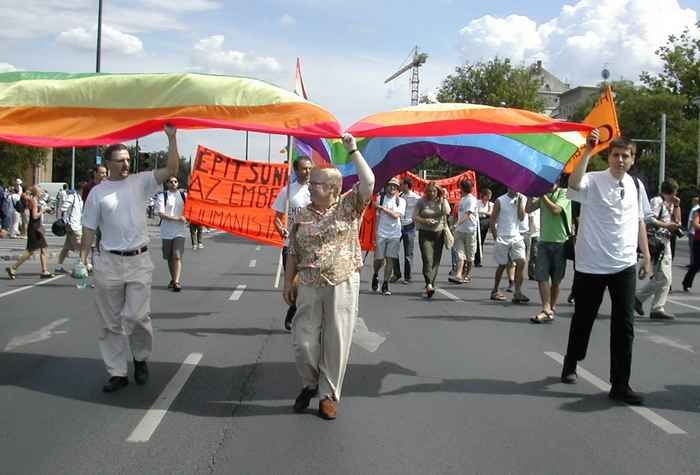Obtaining your doctorate at 82: Joke Swiebel has been investigating gay politics for 60 years
From the first demonstration to the last change in the law
25 January 2024
60 years of gay politics
After a long absence, Joke Swiebel is back at the UvA. Having studied Political Science in the 1960s, she ‘returned to the fold’ in 2023 as an external PhD candidate. The subject of her thesis is the history of gay life in the Netherlands across six decades, with a particular focus on legislation. She has zeroed in on four items of legislation: the repeal of the higher age of consent for homosexual intercourse, the Equal Treatment Act, the Same-Sex Marriage Act and an amendment to Article 1 of the Constitution. ‘These changes to the law were the subject of much debate among politicians, but were largely overlooked by scholars. That’s why I decided to write a history of gay politics, based on Parliamentary Papers and Proceedings of the House of Representatives,’ Joke Swiebel explains.
Europe’s first demonstration
Swiebel witnessed this part of history from up close: in the late 1960s, she chaired the Federation of Student Working Groups on Homosexuality, which positioned itself to the left of the original Dutch gay rights group, COC Netherlands. On 21 January 1969, she joined a demonstration in favour of the repeal of Section 248bis – the first demonstration of gay people in Europe and the foundation of the modern gay rights movement. Swiebel looks back on it with equanimity: ‘All things considered, it was a rather sedate affair. We protested at the Parliament building (Binnenhof) with signs and balloons. Members of parliament who were involved in the matter came outside to show their support. There I was, stood behind a microphone in my Sunday best.’ Sedate or not, the demonstration was a success in the end: the controversial provision was repealed in 1971

Emancipation of women
These days, Joke can look back on a glittering career in which her roles in The Hague and Brussels loom large: she was a policy adviser for several ministries and a member of the European Parliament. Among other things, she was involved in the formulation of antidiscriminatory guidelines and spearheaded a lobby to put LHBTQ+ subjects on the European Parliament’s political agenda. ‘I spent most of my career working on the emancipation of women, where I also encountered some of the things I describe in my thesis. I could even cite myself in some of the footnotes.’

Occasionally, the political debate meandered. We had to put up quite a fight.Joke Swiebel
Objections and debate
When asked what message she would like her thesis to spread, Joke Swiebel does not hesitate. ‘People have to realise that gay rights didn’t materialise out of thin air,’ she says firmly. ‘The young people of today may feel it’s self-evident that the Constitution stipulates equal rights, but things weren’t always thus. There was plenty of opposition, and all those legislative amendments underwent many drafts. Occasionally, the political debate meandered. We had to put up quite a fight.’
Tempting fate
When the highest academic honour is within reach, the average PhD candidate tends to look ahead to the next research opportunity. Swiebel is a little more circumspect. ‘At my age, 82, making plans for the future is not unlike tempting fate. I hope to be able to catch up on the concert-going and travelling that I missed out on during the coronavirus pandemic. And who knows, perhaps I’ll start writing again on the side – if I feel like it.’
Joke Swiebel will defend her thesis ‘Gay politics in the Netherlands (1966–2023): the symbolic power of legislation’ in the Old Lutheran Church at 14:00 on Friday, 26 January. Supervisor: Prof. W.G.J. Duyvendak. Co-supervisor: Dr D.J. Bos.
